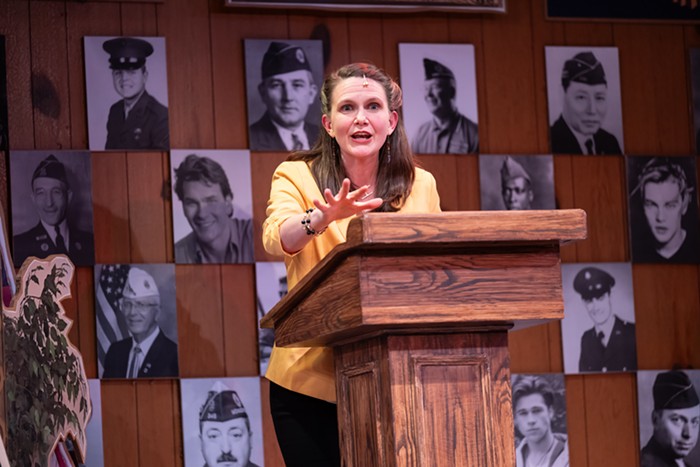If you’ve seen the first episode of the beloved Canadian series Slings & Arrows, you’ll know how opening nights go: The director and the artistic director make their way down to the dressing rooms, there’s a lot of “Good opening!” and thrilled tourists, and then there’s the play, and a lot of drinking.
Though that series pokes fun at the Stratford, Ontario, Shakespeare Festival, openings at the Oregon Shakespeare Festival have a similar air, with insiders hurrying by and air-kissing, complimenting hair and outfits, and saying “Happy opening!” alongside patrons and assorted media people rushing the Tudor Guild for scripts and souvenirs.
After all of that, the plays kick in. This opening weekend sported four lengthy plays—none of this 90-minute no-intermission business—and began with a colorful, energetic Taming of the Shrew.
OSF doesn’t subscribe to the full-on Elizabethan Costumes Must Be Worn For Every Shakespeare Play thing. Both opening Shakespeare plays take place in recent or current time.
For Taming, director David Ivers and his design team set the action on a boardwalk in a fictional town (Padua, Italy, is not on the ocean). This Padua glows and glimmers with neon and rock, with roller girl Bianca (Royer Bockus) and fried-food-slinging Kate (Nell Geisslinger), and with the costumes of boys-on-the-prowl Tranio (John Tufts, about whom all I can say is more comedy, please) and his master Lucentio (Wayne T. Carr).
Who else glows? Petruchio. Ted Deasy, who I've previously only seen in teeny roles at OSF, commands the stage with both his look and his attitude. He’s so good at being a controlling asshole that it’s hard for Geisslinger to match his stride, but at several points she does, given the confines of the script. This play is replete with things 21st century people should find terrible—domestic violence, yes, but also extraordinary rendition, starving, torture by music, deprivation of sleep, etc. You know, the stuff the U.S. military’s been doing to Bradley Manning, and international prisoners, for years.
Possibly the fact that Bianca is reading 50 Shades of Grey early in the production should signal to us that Petruchio’s treatment of Kate is one lengthy S&M game, a game that she enjoys and plays along with (though the play’s action is done to her, no consent involved). The director firmly suggests in his notes that if audience members object, we’re not only anti-love but foolishly unhip and probably just prejudiced against rockabilly master/slave couples. Um, bullshit.
Taming is a superb production, with something for every type of comedy fan—David Kelly as the old lover Gremio, Tufts making one too many jokes about pop stars, Tyrone Wilson in a charmingly amusing turn as Lucentio’s father, etc.—but only if you can stomach the “obedience of women” thread that runs throughout the entire play.
Speaking of the obedience of women, the other Shakespeare that opened last weekend was the Bill Rauch-directed King Lear. Lear vies with Hamlet for best Shakespeare play—and this production nails it cold. Unless you require Ren-Faire-worthy costumes in your Bard productions, stop reading this review, hop to osfashland.org and get tickets.
Let’s say you've never read or seen or listened to King Lear (even the Ian McKellen version), watched the Kurosawa movie Ran (streaming on Netflix! Samurai Lear!) or read Jane Smiley’s Pulitzer Prize-winning novel A Thousand Acres (SO GOOD YOU GUYS, THE BEST NOVEL ABOUT IOWA AND SEXUAL ABUSE EVER). In that case, you need some plot summary. An old king tries to divide his kingdom among his daughters; his youngest daughter refuses to flatter him; Bad Things Happen.
Lear’s perhaps the most Shakespearean of all Shakespeare plays. It combines power, hubris, bad and willful choices, stubborn people, lust, blood (eyeballs get plucked out, onstage), the ever-popular cursing of the womb, terrible weather with ridiculous chance meetings, two armies, approximately a zillion fools in various disguises, betrayal, and a lot more. So. Much. More.
The role of Lear is legendarily demanding (watch Season 3 of Slings & Arrows for a devastating take on it), and this production runs for something like 130 performances. The OSF seems to have worked out a reasonable, if challenging solution fit for a repertory company: Two actors, Michael Winters (Taylor Doose on Gilmore Girls) and Jack Willis, alternate the role, so that each can play other rep roles during the full 11-play season.
The opening featured Winters, who played Big Daddy in the toweringly good Cat on a Hot Tin Roof in 2010. He was tremendous from his first moment onstage to his dying fall. The scene where he curses Goneril (Vilma Silva), the scene in the wheelchair with Cordelia (Sofia Jean Gomez), his final scene—some of the finest moments in theater. That’s true of the script, yes, but Winters thoroughly embodies Lear’s majesty, and Lear’s ultimate ruin.
Silva plays Goneril beautifully, and not only in the “wow, she’s lovely” sense (though well done, costume designer and builder) but because she makes Goneril, for the most part, sympathetic and understandable. Robin Goodrin Nordli is also solid as a rather psychopathic Regan.
The eye-poking-scene is wild, grim, shocking, and messy as hell (kudos to Rex Young for playing a Man United-loving, evil Duke of Cornwall), marvelous in its fierceness and challenging for the crew to clean up during the second of two intermissions.
This play has such a list of stupendous characters that there’s no way to address them all—but just one more: Daisuke Tsuji acts a damned fine Fool. He makes the jester both an amusing, sharp foil for Lear and a lovingly rendered example of a loyal servant’s powerlessness.
Some things don’t completely work—Richard Elmore’s Gloucester is blusteringly disappointing, no match for Winters, and there’s a lot of fussy stage business that only partly makes sense—but the rest of the play’s more than strong enough to overcome the problems.
Wait, are you still here? Go get your ticket! And take some tissues. You’ll need them.




















